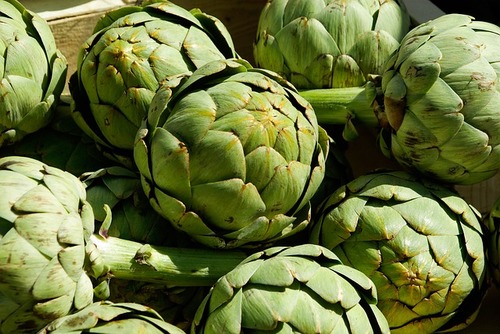Are Artichokes Bad For You?
Short answer
Mistaken for vegetables at times, artichokes are a great way to improve your health and protect yourself from various diseases.
Recommended Alternative
Very healthy and numerous health benefits. Harmful qualities may be associated, but aren't usually serious.
View Full Grading System
Category 'A'
Very healthy and numerous health benefits. Side effects are rare. Things rated an 'A+' are typically necessary for survival (for example, water).
Very healthy and numerous health benefits. A few harmful qualities may be associated, but only under certain circumstances such as an allergic reaction.
Very healthy and numerous health benefits. Harmful qualities may be associated, but aren't usually serious.
It is important to note that even the best things in life can become bad in immoderate amounts. So, although something may be rated an 'A+', overconsumption/overdoing can bring unwanted effects.
Category 'B'
Very beneficial to your health. Things rated a 'B+' may have a few harmful qualities to pay attention to.
Overall beneficial to your health. Things rated a 'B' may have some harmful qualities to pay attention to.
More beneficial to your health than not. However, harmful qualities are most likely associated and shouldn't be overlooked.
The main difference between category 'A' and category 'B' is the harmful qualities typically present in 'B' items. Serious side effects are usually uncommon, but are still possible and should be taken note of.
Category 'C'
Both beneficial and harmful qualities associated. Things rated a 'C+' are typically a bit more on the beneficial side. Still, moderation is important.
A fairly even ratio of beneficial and harmful qualities. Moderation is important. Very general topics that can lean towards both sides of the spectrum will be placed here as well. Rice, for example, can be good or bad depending on the type.
More harmful than beneficial. Side effects are common, especially when consumed/done excessively. Moderation is very important.
Category 'C' usually denotes to both good and bad qualities. When it comes to this category, it is important to keep this word in mind: moderation.
Category 'D'
Harmful to your health. Although benefits may be associated, the bad most likely outweighs the good. Moderation is very important.
Harmful to your health. A few benefits may be associated, but the bad outweighs the good. Moderation is extremely important.
Harmful to your health. Very few, if any, benefits are present. Things in this category should be avoided as much as possible.
Category 'D' is typically for things that are more harmful than beneficial. While consuming/doing something unhealthy once in a blue moon shouldn't hurt, we definitely recommend eliminating 'D' items as a regular part of your routine/diet.
Category 'F'
Category 'F' is for things that fail to bring anything beneficial to the table, and are very harmful to your health. We recommend completely avoiding anything in this category. Long-term side effects of 'F' items are usually very serious.
Category 'N'
'N' stands for neutral. Things placed into this category are generally (a) neither good nor bad for you, or (b) lack the necessary evidence to reach any conclusions.
Long answer
While they are often used as a vegetable, artichokes are, in fact, thistles. Native to the Mediterranean area and found in the cuisines that come from the same location, artichokes offer up several health benefits. Artichokes are a rich source of antioxidants – more so than red wine or even cranberries. Antioxidants, such as cynarine, silymarin, and sesquiterpene-lactones, work to fight against free radicals in the body that can lead to diseases such as cancer and heart disease. Also aiding in the fight against free radicals are several important nutrients, including vitamin C, which boosts the immune system and helps in the prevention of free radical formation and several B-vitamins (vitamin B6, thiamin, pantothenic acid, and niacin) which are instrumental in cellular metabolic function.
Artichokes provide a high amount of fiber – a little over ten grams for every 120-gram serving. This is more than broccoli, prunes, or even lima beans. Not only does a healthy dose of fiber keep the digestive system in good order, it is vital in lowering LDL (“bad”) cholesterol levels. Also helping to lower cholesterol levels are cynarine and sequiterpene-lactones which both prevent cholesterol synthesis and promote its secretion in the bile. Lower levels of “bad” cholesterol mean a reduced risk of atherosclerosis, cardiovascular diseases, and stroke. Artichokes also have respectable amounts of vitamin K, calcium, and phosphorous – all three of which are necessary in maintaining healthy bones and preventing diseases like osteoporosis and osteoarthritis.
Vitamin K also helps to limit neuronal damage in people with Alzheimer’s disease. Important to one’s neurological health is vitamin B12, also found in artichokes. Pregnant women who eat artichoke will be happy to learn that it is a great source of folic acid, a B vitamin that prevents not only neural tube defects in still-forming babies, but congenital heart failure and other defects as well. While some artichoke is GMO, non-GMO artichoke is also on hand and should be purchased when available. GMOs, although still being studied day-to-day, have some serious health concerns and, in our opinion, simply isn't worth the risk of consuming them.
Possible short-term side effects
- allergic reaction
-
increased bile flow, possibly leading to bile duct obstruction
Ingredients to be aware of
Benefits
- lowers cholesterol
-
fights free radicals
-
prevents heart disease
-
strengthens bones
-
boosts immunity
-
helps maintain metabolic function
-
promotes digestion
Our Wellness Pick
(what is this?)
Roland Grilled Artichoke Hearts
- Specialty imported food
- Grilled Roman style
- Marinated in oil
- Hearty 67-ounce package
Learn More!
Please turn your Ad Blocker off to see this content. Thank you!
Thank you for your feedback!
Written by Jeff Volling
Published on: 02-27-2016
Last updated: 12-15-2023
Thank you for your feedback!
Written by Jeff Volling
Published on: 02-27-2016
Last updated: 12-15-2023

 Approved by
Approved by 















